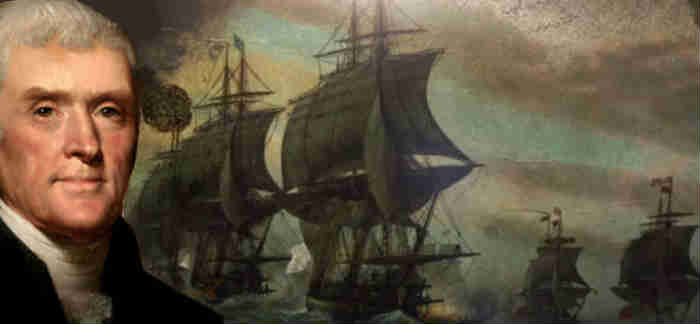I do not believe that he bought a copy of the Quran in order to
glean "knowledge and wisdom," but rather to better understand America's
enemies
The Truth About Thomas Jefferson’s Koran
 The Protestants alone are able to attack the Koran with success; and
for them, I trust, Providence has reserved the glory of its overthrow.—George Sales
(1697-1736) From the introduction to “Jefferson’s Koran”
Islam has been woven into the fabric of our country since its founding.—Barack Obama
We’re going to impeach the motherf—ker.—Muslim Congresswoman Rashida Tlaib referring to President Trump
The Protestants alone are able to attack the Koran with success; and
for them, I trust, Providence has reserved the glory of its overthrow.—George Sales
(1697-1736) From the introduction to “Jefferson’s Koran”
Islam has been woven into the fabric of our country since its founding.—Barack Obama
We’re going to impeach the motherf—ker.—Muslim Congresswoman Rashida Tlaib referring to President Trump
Obama is on record as stating that “Islam has been woven into
the fabric of our country since its founding.” Is that true? Well yes,
sort of.
If by “woven into the fabric of our country” you mean
“following the Revolutionary War, Muslims were America’s first
international enemies,” then yes, it’s true. Muslim pirates helped to
kick start the US Navy into existence. Anchors aweigh Islam!
There
was a definite downside to the United States gaining its freedom from
Great Britain. Among the thornier problems our fledgling country faced
was the fact that America lost the mantle of protection offered by Great
Britain’s large fleet of naval ships. This meant that it was open
season on American merchant ships in the Atlantic, and especially the
Mediterranean—and Muslim pirates in the area were quick to jump on the
opportunity.
For about 600 years, from the
thirteenth to the seventeenth centuries, the pirates or corsairs of
Barbary preyed on European commerce, taking thousands [some say over a million]
of prisoners, and selling them as slaves in the mines or the galleys.
European women were especially prized for their light complexions,
fetching premium prices in the harems. Though prisoners could, in
theory, be ransomed, the going rates for redemption were invariably
high. The lives of most of the slaves, by contrast, were brutal, cruel
and mercifully short.
...In a single six-month period
between 1783 and 1784, the Barbary states sacked three American vessels.
The crewmen were paraded down the streets of Fez and Algiers, pelted
with rotten vegetables and offal, and thrown before the emperor or the
pasha who reportedly told them, “I’ll make you eat stones, Christian
dogs,” and then sold them to the highest bidders. —Michael B. Oren “The Middle East and the Making of the United States, 1776 to 1815”
For those wishing to delve deeper into the topic, I recommend Robert C. Davis’s book “Christian Slaves, Muslim Masters: White Slavery in the Mediterranean, the Barbary Coast, and Italy, 1500-1800”
Interwoven
into our national fabric indeed. The great European fleets of France
and Britain could shrug off the pesky corsairs, or Barbary pirates, as
the Muslims were called. Michael Oren notes that for the British and
French “the pirates were little more than a nuisance, scarcely worth a
broadside, much less a war.”
Such was not the case for the United
States, whose merchant ships were essentially defenseless once they left
America’s ports. In 1794 George Washington authorized the building of
six frigates “adequate for the protection of the commerce of the United
States against Algerian corsairs.”
The U.S. Navy thus was born, a contentious but honorable birth, intended not to rule the waves but to free them. Michael B. Oren “Power, Faith, and Fantasy”
Well, sort of. The birth of the US Navy had rather bumpy beginnings. The US Navy celebrates October 13, 1775 as its official birthday, but that
navy, the Continental Navy, active during the Revolutionary War, was
nowhere to be seen soon after the war ended. Then Washington restarted
it with his six frigates, and Jefferson jumped in and…well, as I say, bumpy beginnings.
The
bottom line is, we have the Muslims to thank for the birth (rebirth if
you prefer) of the US Navy. Which brings us to the topic of Jefferson’s
Koran (Quran).
So why would these Congressional Muslims use a Quran that is admittedly designed to “overthrow” Islam? In a word—ignorance
Recently,
Rashida Tlaib, one of the first two Muslim women elected to Congress,
chose to be sworn in on a copy of the Quran that once belonged to Thomas
Jefferson.
“It’s important to me because a lot of Americans
have this kind of feeling that Islam is somehow foreign to American
history,” she told the Detroit Free Press. “Muslims were there at the
beginning.”
“Muslims were there at the beginning.” Yes
indeed, they sure were, as we have seen. It is worth noting that
America won its first overseas land battle against a foreign enemy by
defeating Muslim troops at the “Battle of Derne” (Derna) in present day Libya during the “1st
Barbary War” in 1805. The leader of the US Marine detachment involved
in the battle was presented with a ceremonial Mameluke sword after the
battle—replicas of this sword are worn by Marine Corps officers to this day.
Longtime
Congress watchers will recall Rep. Keith Ellison (D-Minn.), America’s
first Muslim member of the body, also used Jefferson’s Koran for his
2007 swearing-in. “It demonstrates that from the very beginning of our
country, we had people who were visionary, who were religiously
tolerant, who believed that knowledge and wisdom could be gleaned from
any number of sources, including the Koran,” Ellison told the Associated
Press at the time.—Yair Rosenberg “The complicated history of Thomas Jefferson’s Koran”
The
copy of the Koran that Jefferson owned was translated by George Sales
in 1734. You will recall from the quote of Sales that began this
article that he believed that “Providence has reserved the glory of
[Islam’s] overthrow” to the Protestants. Hardly a Kumbaya sentiment of
multicultural solidarity. So why would these Congressional Muslims use a
Quran that is admittedly designed to “overthrow” Islam? In a
word—ignorance.
In 1786 Thomas Jefferson, along with John Adams,
visited a Muslim ambassador in London, England. In a letter to then
Secretary of Foreign Affairs, John Jay, Jefferson wrote:
We
took the liberty to make some inquiries concerning the Grounds of their
pretentions to make war upon Nations who had done them no Injury, and
observed that we considered all mankind as our friends who had done us
no wrong, nor had given us any provocation.
It
should be noted that the United States had been paying extortion money
to the Muslim pirates, who kept upping the ante (by the year 1800 these
extortion payments amounted to 20% of the American government’s expenditures).
The
Ambassador answered us that it was founded on the Laws of their
Prophet, that it was written in their Koran, that all nations who should
not have acknowledged their authority were sinners, that it was their
right and duty to make war upon them wherever they could be found, and
to make slaves of all they could take as Prisoners, and that every
Musselman who should be slain in battle was sure to go to Paradise. —Thomas Jefferson “American Commissioners to John Jay, March 28, 1786”
As
the late Christopher Hitchens wrote concerning the Muslim ambassador’s
reply: “Medieval as it is, this has a modern ring to it.” Indeed, it
does, more’s the pity.
I do not know how John Adams (2nd president of the United States) felt about Islam, but I have no doubt how one of his sons, John Quincy Adams (6th president of the United States), felt. John Quincy Adams, fervently anti-slavery,
is perhaps best remembered these days for his passionate and cogent
defense of a group of Africans who commandeered a Spanish slave ship, as
depicted in the movie “Amistad.” In an essay he wrote on the long series of Russo-Turkish wars (17th century to 20th century) he left no doubt about his feelings about Islam:
Adopting
from the new Revelation of Jesus, the faith and hope of immortal life,
and of future retribution, he [Mohammed] humbled it to the dust by
adapting all the rewards and sanctions of his religion to the
gratification of the sexual passion. He poisoned the sources of human
felicity at the fountain, by degrading the condition of the female sex,
and the allowance of polygamy; and he declared undistinguishing and
exterminating war, as a part of his religion, against all the rest of
mankind. THE ESSENCE OF HIS DOCTRINE WAS VIOLENCE AND LUST—TO EXALT THE
BRUTAL OVER THE SPIRITUAL PART OF HUMAN NATURE…. Between these two
religions [Christianity and Islam], thus contrasted in their characters,
a war of twelve hundred years has already raged. The war is yet
flagrant…. While the merciless and dissolute dogmas of the false
prophet shall furnish motives to human action, there can never be peace
upon earth, and good will towards men. [The words in caps are as originally printed].
First Barbary War
John
Quincy was not one to beat around the bush…but back to Jefferson. I do
not believe that he bought a copy of the Quran in order to glean
“knowledge and wisdom,” but rather to better understand America’s
enemies.
Shortly after being sworn in as president (3rd
president of the United States) Jefferson stopped all extortion
payments to the Muslim pirates and sent US Navy warships to confront
them in the Mediterranean. Soon afterwards the United States (and Sweden) were fighting Muslims in the “1st Barbary War” (1801-1805).
In truth, the “1st Barbary War” was neither a beginning nor an end, but merely one installment in the ongoing “long war.” Tours, Lepanto, Vienna...those who don’t know history are doomed to repeat it.
Jim ONeill -- Bio and Archives | Comments
Born
June 4, 1951 in Philadelphia, Pennsylvania. Served in the U.S. Navy
from 1970-1974 in both UDT-21 (Underwater Demolition Team) and SEAL Team
Two. Worked as a commercial diver in the waters off of Scotland,
India, and the United States. Worked overseas in the Merchant Marines.
While attending the University of South Florida as a journalism student
in 1998 was presented with the “Carol Burnett/University of Hawaii
AEJMC Research in Journalism Ethics Award,” 1st place undergraduate
division. (The annual contest was set up by Carol Burnett with money
she won from successfully suing a national newspaper for libel).
Awarded US Army, US Navy, South African, and Russian jump wings.
Graduate of NOLS (National Outdoor Leadership School, 1970). Member of
Mensa, China Post #1, and lifetime member of the NRA and UDT/SEAL
Association.



